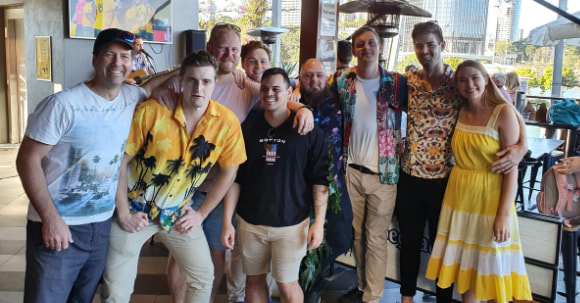Dan Collins joined Calibre as a graduate engineer back in 2007. He’s now a principal engineer overseeing important urban development projects out of Brisbane. He shares the thrill of seeing his projects come to life, his passion for mentoring others and what’s kept him at the organization for 13 years.
It was a love of math and physics that led Dan down the engineering path after high school, and while he was studying a friend recommended he get some work experience at Brown Consulting (later acquired by Calibre).
“I applied for an undergraduate engineer role and started working a couple of days a week while I finished my studies, and I absolutely loved it! I loved the company and working in urban development,” he explains.
Since then, Dan has transitioned from undergraduate engineer to engineer, senior engineer and now principal engineer at Calibre, with each title change bringing more responsibility and bigger projects.
“I’m not on the projects day-to-day anymore. Instead I’m overseeing them and making sure things are running smoothly and everyone has the resources they need to get the job done.”
But the field of urban development has remained a constant throughout Dan’s engineering career.
“It’s the coordination and collaboration that I love about urban development. We work alongside a number of other disciplines, such as structures, and stormwater and flooding, and bring those specialties into our deliverables. You get a taste of everything,” he says.
“I also enjoy not being stuck behind a desk all the time and working in a team environment. We have a great team culture where we always help and look out for each other.”
But one of the most rewarding parts of the job, says Dan, is seeing his projects come to life. This might be driving through a large-scale residential subdivision where hundreds of people now live or crossing a bridge that’s a culmination of 10 years’ work.
Advice for aspiring engineers
Dan also gets much career satisfaction from mentoring the next generation of engineers and watching them grow within their careers. His advice for aspiring engineers is to keep looking for opportunities to broaden your knowledge.
“You never stop learning in this industry, so just being proactive, doing the research, building your networks and trying new things will put you in good stead.”
Another crucial skill in engineering is the ability to communicate effectively, says Dan.
“The job involves a lot of communicating with people, whether that be talking to the team internally to manage the workload or communicating to our clients about how the project’s tracking and whether there are any cost variations or program overruns.”

Adjusting to leadership
Moving into management introduced a whole new learning curve for Dan.
“It’s one thing to be a good engineer, but it’s another thing again to be a good manager. And it’s something I’m still learning about and working on each day. But I’m really enjoying the challenge.”
Formal leadership learning and training has been the key to building Dan’s confidence in this area, which Calibre provided to assist his transition into a leadership role.
“When you study engineering, you learn about engineering, not about management, so in taking that next step you need to do some leadership training yourself. You need to learn how to understand different personalities and what makes people tick, as everyone’s different.”
And if he has one piece of advice to give others starting out on their management journey it’s to create an honest dialogue with your team.
“If you encourage open communication in your team it enables you to create flexibility in expectations when needed but also push for difficult timeframes and outcomes to be met when necessary.”
Parental leave and career opportunity
Originally from Victoria, Dan is a keen AFL fan, and enjoys spending his weekends in the garden and with his family, which includes an 11-year-old daughter and five-month-old son.
When his son was born, Dan benefited from Calibre’s new parental leave policy, which consists of six weeks paid leave for the primary caregiver and – recognizing both parents have an important role to play in welcoming a new child – five days paid leave for the secondary caregiver.
“I appreciated being able to have that extra time with my newborn. My wife also needed my support at home, as she’d had a cesarean, so it was helpful to have the extra five days and not have to worry about work,” he says.
“It’s been great to see a number of men in the office take advantage of the paid parental leave for secondary carers. In our team [of 30 people], there’s already been three of us that have benefited.

“One of Calibre’s values is that we care for people’s wellbeing, and there’s definitely the support in place to care for that of employees.”
But it’s not just the wellbeing support that Dan’s grateful for – it’s also the career support.
“I’ve always had good mentors and good training throughout my time at Calibre, and anytime I’ve asked to take on more responsibility, I’ve been given the opportunity. I’m grateful I’ve been given those chances.”
